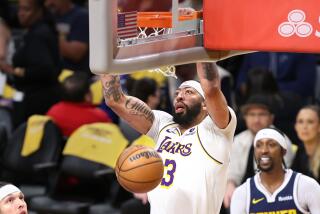Lakers’ Victory Is No Nugget
- Share via
The Denver Nuggets staged an amazing comeback Sunday night.
From the dead.
Deciding not to stop there, they also got back in the game, as if simply proving one existed wasn’t enough. Down by 14 points after a record-setting first quarter of futility, by 20 at halftime and by 26 with 3:55 left in the third quarter, the Nuggets rallied within eight on two occasions in the fourth period before finally being dispatched by the Lakers, 104-96, at the Forum.
The Nuggets would have reason to feel proud if they weren’t feeling so embarrassed.
Nine points in the first quarter?
Twenty-nine in the half?
“When we got to 10, I wanted to celebrate,” Denver Coach Dick Motta said. “I wanted to do cartwheels.”
So imagine his delight at what transpired next. The Nuggets were down, 84-76, with 5:26 left and then, 100-92, with 46 seconds remaining and three-point marksmen at the ready.
Both times, though, the Lakers repelled the rallies. Of course, they were well aware that a fourth-quarter stand shouldn’t have been necessary.
“Maybe it’s because we’re young,” Eddie Jones said. “I don’t know. Maybe it’s that. But I don’t think being young is any excuse for that.”
Added Coach Del Harris: “These days, you never know what you’re going to see.
“What happens so often is you get a little careless and lose a little concentration. That’s a dangerous thing to do with Denver when they have so many dangerous shooters.”
At least they are sometimes.
Sunday, Dale Ellis was seven of 21 from the field. Bryant Stith was four of 12, Mark Jackson two of seven. At least Antonio McDyess was respectable, for them, at 11 of 25 while scoring a game-high 26 points. In all, the Nuggets shot 40.5%, most all of the success coming from a second-half explosion of 67 points.
For all the attention being given to the Depression era for NBA offenses, this was the Lakers’ first look at an offense, including their own, that belonged in the World Cup. The only thing that came close was the 76 points by the Pistons two nights earlier.
But this was different. This was bad to historical proportions.
The Nuggets, 18th in the league in scoring coming in at 93.1 points a game, shot 19% in the first quarter, making four of 19 shots, with Ellis going two of eight.
They had four points with 4:11 gone, eight points after 8:16 had elapsed, and nine points when Jackson made one free throw with 2:19 remaining. And then the Nuggets had a record--nine being the fewest in a period in franchise NBA history. It was also the fewest against the Lakers since Houston had seven on Nov. 15, 1991.
At least Denver had finally discovered an offensive set that could produce: Jackson from the line. It also accounted for their next point. Of course, there was seven minutes and 15 seconds between the free throws.
That made it 33-10. But that’s also when the Nuggets, having opened four of 27 from the field, found their stride, or at least first gear, following Jackson’s solo with back-to-back baskets. Both were from Tom Hammonds, closing the deficit to 35-14. Harris decided against calling a timeout to halt the momentum swing.
It was 49-29 at intermission, with the Nuggets shooting 25.7% (nine of 35) while also committing 13 turnovers against seven assists. No Laker opponent had been so pointless in a half since the same Rocket game in 1991.
“It was kind of strange,” Jones said of looking at the scoreboard and after a period and then at the break. “When I saw that, I was like, ‘Oh, my God. Are we going to give it up or are we going to build on it. That was the question going through my mind.”
He got the answer soon enough. Just not the one he was hoping for.
But while Denver recovered, the hosts survived. The Nuggets may have saved face with the second half, but the Lakers saved the night.
(BEGIN TEXT OF INFOBOX / INFOGRAPHIC)
A Season of Expectations
The Lakers acquired nine new players this season, including Shaquille O’Neal and his $120-million contract. In turn, with big acquisitions come big expectations. Throughout the season, The Times will monitor O’Neal’s numbers along with how the team compares to some of the best Laker teams in history.
GAME 18 OF 82
* Record 12-6
* Standing 2nd place
Pacific Division
1996-97 LAKERS VS. THE BEST LAKER TEAMS
*--*
Year Gm. 18 Overall 1987-88 12-6 62-20 1986-87 15-3 65-17 1984-85 12-6 62-20 1979-80 13-5 60-22 1971-72 15-3 69-13
*--*
Note: The five teams above all won NBA championships
THE SHAQ SCOREBOARD
Basketball Numbers
* Sunday’s Game:
*--*
Min FG FT Reb Blk Pts 40 10-19 4-7 16 4 24
*--*
* 1996-97 Season Averages: *--*
Min FG% FT% Reb Blk Pts 38.9 .600 .449 13.3 2.5 24.9
*--*
* 1995-96 Season Averages: *--*
Min FG% FT% Reb Blk Pts 36.0 .573 .487 11.0 2.1 26.6
*--*
Money Numbers
* Sunday’s Salary: $130,658.53
* Season Totals: $2,351,853.54
* FACTOID: In game 18 of the 1979-80 season, rookie guard “Mike” Cooper made five consecutive shots in a key stretch of the fourth quarter as the Lakers defeated Denver, 135-128. Cooper was referred to as Mike, rather than Michael, throughout his rookie season.
More to Read
All things Lakers, all the time.
Get all the Lakers news you need in Dan Woike's weekly newsletter.
You may occasionally receive promotional content from the Los Angeles Times.






